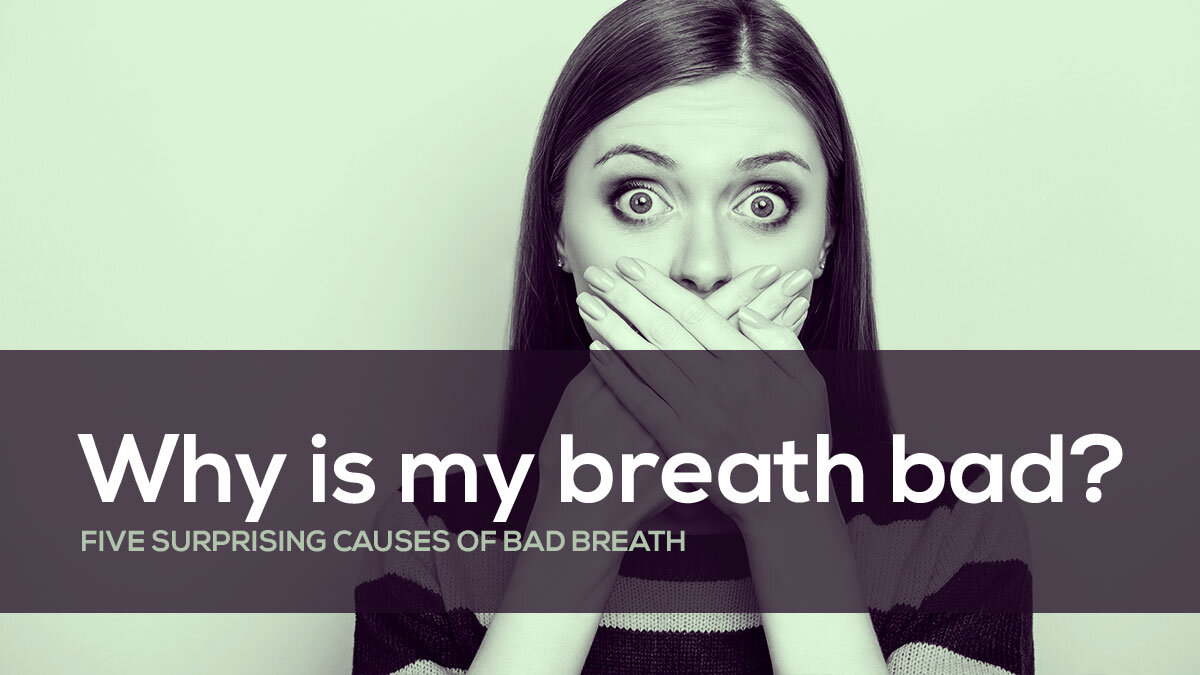How to Relieve Gum Pain
Pain in your gums can be caused by health issues ranging from minor to major, so it is very important that you know the exact cause of your gum pain. On the minor end, gum pain can be caused by brushing incorrectly or eating food that was too hot, while on the major end, your gum pain could be caused by gum disease or oral cancer. If you are unsure of the exact nature of your pain, be sure to visit your dentist for a full diagnosis.
Why is my breath bad? Five Surprising Causes of Bad Breath
Bad breath is a problem few people want to talk about. Not even your best friend will tell you if you have it, but it's a common problem family dentists see all of the time. If you suffer from halitosis, the medical term for bad breath, you're in good company! Most people have it when they first wake up in the morning because of a dry mouth. However, one out of four people have an unpleasant mouth odor frequently and many aren't aware of it. Good oral hygiene and avoiding foods that produce mouth odor, like garlic, reduce the risk, but sometimes bad breath has other causes that aren't related to how well you brush and floss your teeth or what you eat. Here are five common causes of bad breath you might not be aware of.
Medications
Prescription and non-prescription medications can cause bad breath or make the problem worse. That's because some medications reduce saliva production and contribute to a dry mouth. Saliva has the useful purpose of keeping bacteria that cause halitosis in check. If you don't produce enough saliva because of the medications you're taking, you're less able to clear out bacteria that produce malodorous compounds. Even common medications, like antihistamines and decongestants used to treat seasonal allergies, can dry out the mouth and cause mouth odor. Other common culprits that do this include meds used to treat psychiatric conditions, diuretics, and some blood pressure medications.
Alcohol Consumption
Alcohol has a distinctive aroma that can linger on your breath and some people find the smell offensive. However, alcohol also dries out your mouth. As with medications, less saliva means less protection against bacteria that curb mouth odors. If you're on a date, it might be best to skip the alcohol!
Following a Low-Carbohydrate Diet
Low carbohydrate diets are the rage these days, as people look for ways to lose weight. A low-carb diet might give you a weight-loss edge, but it also contributes to halitosis. When you reduce your carb intake as low as many low-carb diets recommend, your body turns to fat as a fuel source. In turn, your liver converts the breakdown products of fat into ketone bodies. Unfortunately, ketone bodies give a fruity smell to the breath that can be offensive. Drinking more water may help dilute the odor, but not everyone who eats a low-carb diet experiences this side effect. It depends on how much you reduce your carbohydrate intake and how long you've been on the diet. Ketone breath sometimes disappears after a few weeks as the body adapts to fewer carbohydrates. The period of adaptation varies from person to person.
Upper Respiratory Infections or Sinusitis
It's not uncommon to have bad breath if you have a cold or a sinus infection, and taking decongestants or antihistamines for the symptoms can worsen the problem by drying out your mouth. Another reason you might have halitosis with a cold or sinus infection is because of the post-nasal drainage that accompanies the infection. When your sinuses or respiratory passages are inflamed, you produce more mucous that drains down the back of your throat. Bacteria in the mucous produces substances that cause bad breath. Fortunately, bad breath often goes away with the infection. Many of these infections are viral and clear on their own, but some may be bacterial and need antibiotic therapy.
Heartburn or GERD
GERD or gastroesophageal reflux disease is a common condition where acid backflows from the stomach into the esophagus. If you have GERD you might experience heartburn, a burning sensation in your chest, and regurgitation of acid and stomach contents into your mouth. Along with a sour taste in your mouth, your breath may take on an unpleasant aroma. Fortunately, there are medications that can treat the symptoms of GERD. If you have it often, your health care provider may recommend treatment as the acid can damage the lining of the esophagus and cause complications, including esophageal cancer. Treating GERD should also reduce the bad breath that goes along with it.
The Bottom Line
As you can see, bad breath, or halitosis, has many causes. The best way to find out what's causing it is to see your family dentist to rule out dental causes, such as dental caries or gum disease. If that doesn't show the cause, it's important to rule out the causes and conditions above. Treatment will depend upon the underlying cause.
Related Bad Breath Articles
 Bad Breath - More Than Just Embarrassing
Bad Breath - More Than Just Embarrassing
The bane of humans for thousands of years, bad breath may be no more than the result of poor oral hygiene - or a sign of a more serious, underlying condition. Get the facts on what causes bad breath, and what you can do about it...
Read Article









